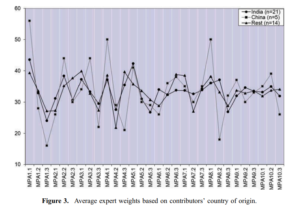Quantifying the qualitative: Eliciting expert input to develop the Multidimensional Poverty Assessment Tool
 Abstract/Summary: This article discusses the participatory creation of the Multidimensional Poverty Assessment Tool (MPAT), a survey-based thematic indicator developed in China and India. The core of the article focuses on the use of expert elicitation to inform the construction of MPAT’s household and village surveys, the cardinalisation of survey responses, and the weighting scheme design. This is followed by a discussion of the potential pitfalls of expertise in development, the decision not to aggregate MPAT into an index, creating locally relevant poverty lines, and ideas for future research. The article closes with a summary of lessons learned.
Abstract/Summary: This article discusses the participatory creation of the Multidimensional Poverty Assessment Tool (MPAT), a survey-based thematic indicator developed in China and India. The core of the article focuses on the use of expert elicitation to inform the construction of MPAT’s household and village surveys, the cardinalisation of survey responses, and the weighting scheme design. This is followed by a discussion of the potential pitfalls of expertise in development, the decision not to aggregate MPAT into an index, creating locally relevant poverty lines, and ideas for future research. The article closes with a summary of lessons learned.
Quantifying the qualitative: Eliciting expert input to develop the Multidimensional Poverty Assessment Tool
Authors: Cohen, A. & Saisana, M.
Publication Year: 2014 | Journal / Publisher: Journal of Development Studies
 Abstract/Summary: This article discusses the participatory creation of the Multidimensional Poverty Assessment Tool (MPAT), a survey-based thematic indicator developed in China and India. The core of the article focuses on the use of expert elicitation to inform the construction of MPAT’s household and village surveys, the cardinalisation of survey responses, and the weighting scheme design. This is followed by a discussion of the potential pitfalls of expertise in development, the decision not to aggregate MPAT into an index, creating locally relevant poverty lines, and ideas for future research. The article closes with a summary of lessons learned.
Abstract/Summary: This article discusses the participatory creation of the Multidimensional Poverty Assessment Tool (MPAT), a survey-based thematic indicator developed in China and India. The core of the article focuses on the use of expert elicitation to inform the construction of MPAT’s household and village surveys, the cardinalisation of survey responses, and the weighting scheme design. This is followed by a discussion of the potential pitfalls of expertise in development, the decision not to aggregate MPAT into an index, creating locally relevant poverty lines, and ideas for future research. The article closes with a summary of lessons learned.
PDF on Publisher Website | PDF on OSF
